Scott Edwin Williams's Blog, page 2
December 17, 2022
We’ve Never Had It So Good?
Doom. Gloom. Calamity. After everything humanity has endured in the last few years: global pandemics, moronic populist leaders, climate change, Vladimir Putin, and the Kardashians, one would be forgiven for thinking that our species is swirling down the plughole of history. I mean, it makes sense, doesn’t it?
But what if I told you that, measured across a number of crucial metrics, such as literacy, life expectancy, infant mortality, famine, poverty, violence, work health and safety, housing, technology and education, that (to paraphrase Harold Macmillan) we’ve never had it so good?
You’d be incredulous, I’m sure, but let’s look at a few examples.
I assume readers with young kids don’t want them to die of disease. Well, for most of human history, 50% of children didn’t make it to the age of fifteen, dying of simple maladies that are routinely treated nowadays. Medical advancements over the past two hundred years ensure today’s two-child families mostly stay that way. And medicine is improving every day.
Yet, some readers who accept that medical research has improved our lives might still argue, “Yes, but what about humanity’s destructive tendencies? The world is a more dangerous place than ever.” While I can understand the impulse to think this way, this proposition is patently wrong. In The Better Angels of Our Nature, cognitive psychologist Steven Pinker clearly demonstrates how violence—including war, deaths by terrorism, and rates of homicide—has steadily declined over the years, despite the public perception to the contrary.
How about technology? Has that gotten better? Now, that’s an easy argument. Let me answer with the example of my grandmother who was born in 1895, before the invention of powered flight, yet lived to see humans land on the Moon. Now that’s technological advancement. As a young married woman, she washed clothes by hand in a copper boiler, yet by her death in 1986, people had been using fully automatic washing machines for decades. Household electricity wasn’t even available in her hometown until 1904, but when it came, it brought innovations such as: Electric lights, labor-saving devices, and eventually, radio and television. In her youth, it was still possible to die of smallpox, tuberculosis, diphtheria, and even the plague. Understandably, my grandmother used to laugh derisively at people who longed for the ‘good old days’.
The truth is our quality of life is at an historic high. When the current era is studied by future historians, on statistics alone, they’ll view it as a marked improvement on what came before. However, there are also anecdotal factors that also point in the same direction.
Let’s face it, our minimum expectations are so much greater than our ancestors’ wildest dreams. We expect to live in McMansions when they just hoped for a roof over their heads. We need vacations around the world; they’d have been happy for a weekend off work. When we dine out, we expect Instagrammable food presentation, while they just tried not to starve. There’s a reason many of today’s petty complaints are written-off as ‘First World problems.’
Humans always want better. Our need for self-improvement is deeply embedded in our collective psyche. Parents work to give their children better opportunities. Religions seek to move believers towards enlightenment. Corporations strive to maximize stock values. Inventors are still trying to build a better mousetrap. There’s a reason Self-Help is such a popular book category, because we always want to ‘level-up.’ Well, so do civilizations, and right now, humans are as leveled-up as we’ve ever been.
At this point, I expect most people are asking the question: “If we’re all doing so bloody well, why do we all feel so terrible?”
The World Happiness Report describes the last ten years as “a long-term moderate upward trend in stress, worry, and sadness in most countries and a slight long-term decline in the enjoyment of life.” Why all this sadness and stress if things are getting better?
There’s no doubt we’ve been through a lot recently (such as the aforementioned pandemics, wars, and climate change, etc.), but our narrowly focused sense of perspective also plays a large role in how we perceive our circumstances. We tend to view current events through the lens of the 24-hour news cycle which regurgitates bad news hour after hour. And that’s not even counting the fake news that’s specifically designed to outrage us.
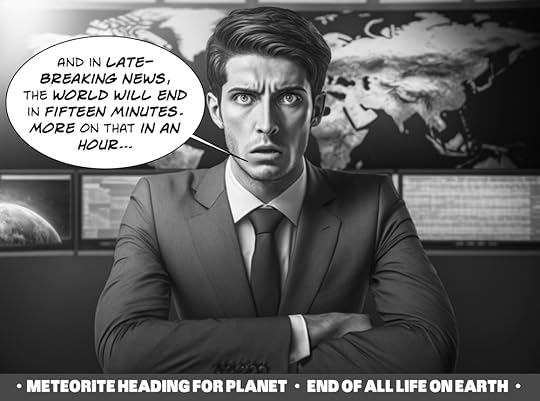
Eventually the 24 hour news cycle will end… (Midjourney and S.E.W.)
Then we doomscroll through our social media feeds, the algorithm continually stoking our confirmation biases and fueling our darkest thoughts. Worse still, our leaders attempt to appeal to the lowest common denominator, and are driven to myopic short-term decisions based on the paranoia and fear induced in the community. It’s a self-perpetuating cycle.
We need to change our perspective, step back, and take in a more global view.
An overarching view of history, such as that provided by David Christian’s Big History helps with readjusting our perspective. Big History doesn’t sweat the small stuff. It is about big ideas and monumental movements which shift the zeitgeist, most improving the lot of the human race. It’s about the incremental growth of humanity’s intellectual capital.
Across hundreds of thousands of years of collective learning, humans developed from inconsequential apes to the most powerful creatures on the planet, all by iterative development. And we’re still going. The bottom line is that, when viewed dispassionately from sufficient distance, humanity is on a gradual, quantifiable, albeit slightly wonky, uptick.
Surprised? You should be. Like I said, watching the news rightly fills us full of dread. We need to look beyond the details and see the big picture. We need to think in geological timeframes. We also need to think positively.
It is that human ingenuity that propels civilization’s upward trajectory. When humanity stumbles into a pothole, it eventually drags itself out and moves slowly but inexorably towards better ideas. Socially, scientifically, and even politically. Yes, these potholes can sometimes be difficult to escape. Sometimes, it even seems like human achievement is dead. However, when viewed through the lens of Big History, these potholes are minor corrections.
I’m not for one moment saying that times aren’t tough right now. Our confidence has been shaken on a number of fronts. Climate change looms, causing us to rethink our way of life. The information revolution and globalization have displaced many people from their jobs. Social media has given a platform to people who really shouldn’t have one.
People are worried and looking for easy answers.
Yes, things may seem bleak right now, but in time, a new and better equilibrium will be reached. Let’s face it: every time we’ve had our backs against the wall, whether it be after the Black Death or world wars, we have recovered and rebuilt. Adversity begets innovation. New technology and new ideas in public policy emerge to meet the challenges.
Education and creativity will allow us to solve our multitude of problems, the solutions won’t just magically appear, and there will be pain along the way. We face real problems that will require some heavy-duty big ideas to find a solution. Recovery isn’t guaranteed but, given what we’ve seen over the arc of history, it’s likely.
It will be a combination of collective learning and humanity’s lightbulb moments that will save us. We’ll survive further pandemics, climate change, Putin, and even the Kardashians.
Just don’t give up hope.
* * *
November 29, 2022
Ch-ch-ch-changes
Nowadays, I find change easy.
I haven’t always been this way, but the slings and arrows of outrageous fortune have, to a certain extent, inured me to most types of adjustments, developments, innovations, modifications, revisions, or any other synonyms for ‘change’ that the thesaurus can throw at me.
While writing my books, I've been on the look out for illustrations that I can use to illustrate my chapters. These are usually nineteenth century engravings of historical events that look old timey enough to fit the historical theme.
But recently, I've discovered AI illustration through DALL-E or Midjourney. I'm particularly taken with Midjourney, as it's allowed me to make illustrations of things that I haven't been able to find pictures of. For instance, there were no pictures of the Incan emperor Pachacuti near Machu Picchu, yet now there is one, thanks to Midjourney and my prompts (see below).
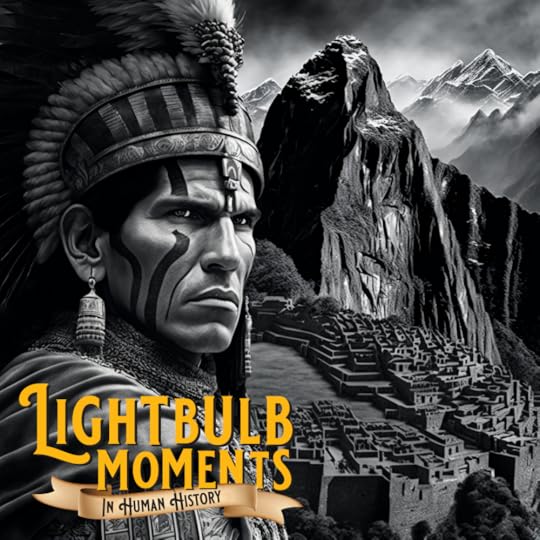
I was initially horrified that artificial intelligence could be, with minimal (but crucial) input, so artistic. It was a change that I wasn't expecting.
Yet changes come, whether we want them or not. Our challenge is to respond to these adjustments, developments, innovations, modifications, or revisions, with our own intelligence and creativity.
Here's hoping I can continue being able to change and grow.
November 15, 2022
The Year of Living Dangerously Winds Down...
Well, it's been a hell of a year.
Even after three years of a pandemic, and the deaths of both my parents not long before that, this year has been remarkable for the drama it's brought to my life.
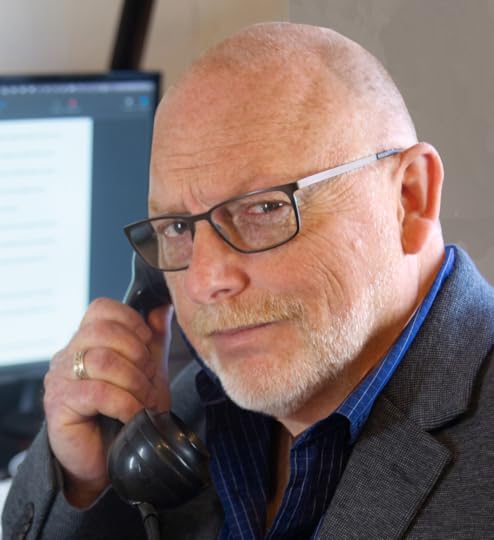
I've suffered continual rejection by strangers. I've been the subject of harsh critiques and glowing praise. I've had certainties stripped away, and bizarre opportunities fall into my lap. I've struck up email correspondences with famous people. I even had Nancy Sinatra (of all people) follow me on Twitter for an inexplicable reason.
So after all that, what have I learned?
I've learned that I've been living my life wrong for the previous 58 years. I was always concerned about having drama in my life, and worried about being judged, rejected, and mocked. Yet I was judged, rejected, and mocked (repeatedly!) this year, and it didn't break me. Surprisingly, it didn't even hurt me.
And no one is more shocked by this than me.
I still don't like drama, but I won't actively avoid it any more. I've learned to be more assertive too, even though it's difficult to change the habits of a lifetime. Nevertheless, I've found a new, positive way forward.
Having said all that, I don't regret my life so far... I've been incredibly fortunate in many ways. But maybe I've let some opportunities go by because I was too afraid to grasp them.
I'm not afraid any more.
October 24, 2022
Arrested development...

As I draft the final chapter of Lightbulb Moments in Human History: Peasants to Periwigs (book two of the series), I reflect on a two-and-a-half year period of my life characterized by frenetic activity.
In the dim, dark years B.C. (Before Covid), I'd written nothing. I didn't even have a concept for a book. Then I hit on the idea of writing an amusing, yet factual, history of education.
About 25,000 words in, I realized that book:
had limited marketing and sales potential, and would drive me insane if I wrote it.Luckily, while I drafted that book, I encountered many of humanity's big ideas, and thought maybe THEY would be a great idea for a book.
And so, here we are.
Book one hasn't even been released yet, and I have no idea how it will be received. I got a great review the other day in the UK's How It Works magazine. I'm quite happy about it, so I'll share it below:
Unlike other books that offer up humanity’s achievements in a top-ten fashion, Lightbulb Moments in Human History is written in a continual narrative from the witty and humorous perspective of its author.
As the title suggests, you can expect to discover some of the many milestones that define humankind, from the Neolithic Revolution of early agriculturists to the rise of the Roman Empire. You’ll also explore some of the concepts that shaped human lives, such as religion and misguided medicine.
In keeping with Scott Williams’ humour, which leans towards an adult audience in parts, throughout each chapter are amusing meme-style images to add further levity to the eccentricities of humankind.
Wit aside, this book is expertly written and packed with interesting information and educational insight into the past. Whether you’re a history buff or looking to expand your historical horizons, this book is a great read.
However, I've had one very negative review, which I won't share here... Let's just say that I hope the bulk of my readers see the book like How It Works does, and not like the reviewer on Netgalley (who thought it was a 'spurious book')!
I've also made some recent gains in creating a mailing list, which is very gratifying after such a hard slog getting anywhere with it. If you're reading this and haven't yet subscribed, please do so via the sign up form you'll find at https://www.lightbulbmomentshistory.com/
Till next time,
Scott
September 29, 2022
Nine Months of Living Dangerously
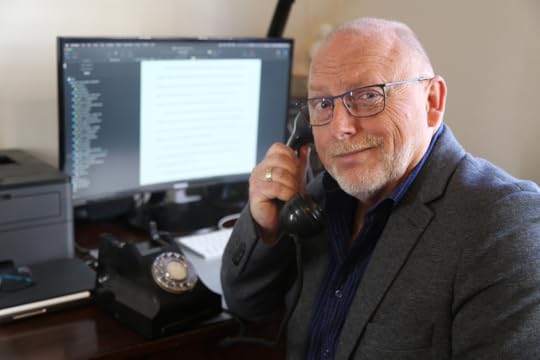
Sometimes I felt like this, but living dangerously paid off...
I started this year on a low.
A bout of glandular fever, constant rejection of my manuscript from agents, a dose of COVID, and another couple of setbacks had me on the back foot. In an effort to drag myself out of the doldrums, I declared in my journal that this would be my Year of Living Dangerously – I would say ‘yes’ to things I would usually decline.
As a part of this, I gave up on agents and began to submit straight to publishers, and within a month, this strategy paid dividends. John Hunt Publishing accepted my book, and my life was suddenly set on its head. I got involved in the publishing process. I created a website. I went into overdrive on Twitter (@somewhathistory), and began to build my TikTok presence. I started being interviewed on podcasts (one of which turned out to be a scam).
Over the last nine months I’ve designed my own book cover, organized a photoshoot, worked with my amazing editor, Jim Bessey, liaised with famous people trying to get an endorsement (and got one from the wonderful Dr Karl), I started a YouTube channel, I’m working on creating a podcast with my friend C.J., received the first hard copy of my book, and I’ve nearly finished writing my follow-up book.
But none of that would have happened if I hadn’t been living dangerously.
I recommend trying it sometime.
Scott
September 12, 2022
A Historical Moment
This week, we saw a moment in history – the death of a monarch. It wasn’t a lightbulb moment, for sure. It wasn’t a paradigm shift or a brilliant new idea. But it was an ancient concept steeped in tradition.
The Queen is dead. Long live the King.
The outpouring of grief from the English people was at once weird and understandable. Weird, because almost none of those grief-stricken people knew this dignified 96-year-old lady. And understandable, because Elizabeth II is the only head of state most of those people had ever known.
Elizabeth II had rendered a lifetime of service to her people. Right up until the last days of her life, she performed one of her necessary constitutional roles, inviting Liz Truss to form a government. That, my friends, is duty.

I’m no Royalist. I voted for Australia to become a republic in the failed referendum. While I’m an Anglophile of English descent, I don’t want the Union Jack on the Australian flag. I want an Australian head of state. Not an English Queen or King.
But when I saw the video of the young Princess Elizabeth in South Africa, promising to devote her “whole life whether it be long or short” to the service of her people. It brought a lump to my throat.
It ended up being an exceptionally long, well-lived life, and she kept her word. In this day and age, that shouldn't be taken lightly.
Don't get me wrong: I still want a republic, but for the time being, that can wait.
Picture: Speedfighter17
September 7, 2022
Meeting Uncle Chris
Yesterday, I took my Year 6 class on an excursion to Lake Parramatta to meet with local indigenous people and gain an understanding of their worldview.
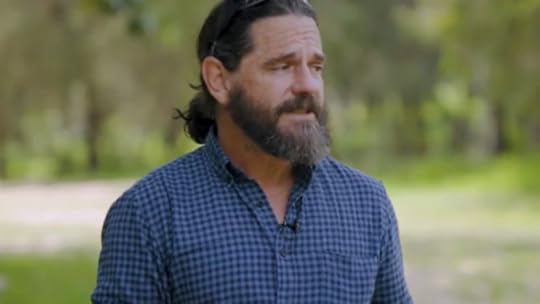
Uncle Chris Tobin
We met Darug man, Uncle Chris Tobin who captivated my kids with his indigenous perspectives on how to live sustainably on the land. We talked about Welcome to Country ceremonies vs Acknowledgement of Country statements, about how the terms 'Uncle' and 'Aunty' are terms of respect in his culture, and about what it was like to a proud Aboriginal man in this day and age.
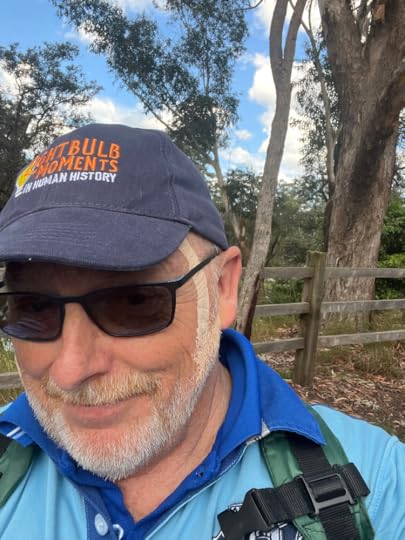
After Uncle Chris painted my face
Uncle Chris changed my mind about Acknowledgement of Country statements, which I've always felt were a bit tokenistic. He made me see that just acknowledging that Australia is Aboriginal land is a big step and that it is appreciated by many indigenous people.
He was incredibly open and gracious, and made a big impression on both my class and me. Thank you, Uncle Chris.
August 27, 2022
One small step...
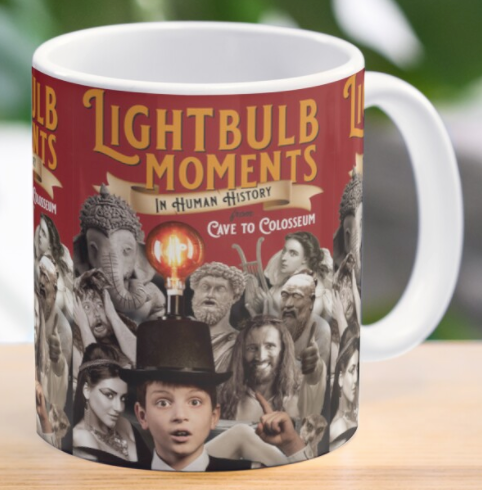
Welcome to my first blog post.
I've wanted to write a blog for a while now, but because I've been slaving away at Lightbulb Moments in Human History for the last two years, blogging seemed a little...let's say, frivolous.
Nevertheless, here we are.
The publication date for Lightbulb Moments in Human History: From Cave to Colosseum is looming large: February 24, 2023. It seemed like a long way away when the book was first accepted for publication, but the more I think about it, the more I see the necessity for the long lead time.
That's because, as this is my first book, I was totally unaware of all the rigmarole that goes along with publication. There's a lot of stuff happening behind the scenes, between the publishers and the distributors. Then there's all the promotion and building an online presence: I've created a TikTok site (@lightbulbmomentshistory), a YouTube channel https://www.youtube.com/channel/UCZcr3uIxrD28fahT7ywowfw, and produced content for both.
I've also continued with Twitter (@somewhathistory) and have begun appearing on podcasts, although the early ones have been a little embarrassing (being interviewed by a guy in a banana costume was a low-light). And god knows, my friend CJ and I are now creating a podcast, but that hasn't seen the light of day yet.
Then there's the Redbubble store, where I've added some designs based on art from Lightbulb Moments in Human History: From Cave to Colosseum.
Of course, while all this has been happening, I've been working on the follow-up book, working title: Lightbulb Moments in Human History: From Peasants to Periwigs. AND somehow managing to work a demanding day-job.
2022 had been an interesting year so far, and that's not even counting the glandular fever and COVID!
I'm planning to keep up with the blogging, but seriously, who knows?
Cheers,
Scott




